|
This is my dynamic, frequently updated homepage. This is a NewsLog, also known as a WebLog or Blog.
Everything is evolving, so don't assume too much.
People to watch:
Adina Levin
Andrius Kulikauskas
Britt Blaser
Catherine Austin Fitts
Chris Corrigan
Clay Shirky
Dan Gillmor
Dave Pollard
David Allen
David Weinberger
Dewayne Mikkelson
Dina Mehta
Doc Searls
Elisabet Sahtouris
Elizabeth Lawley
Euan Semple
Florian Brody
Frank Patrick
Gen Kenai
George Dafermos
George Por
Graham Hancock
Greg Elin
Hazel Henderson
Heiner Benking
Inspector Lohman
Jean Houston
Jerry Michalski
Jim McGee
Jim Moore
John Abbe
John Perry Barlow
John Robb
Joi Ito
Jon Husband
Jon Lebkowsky
Jon Udell
Jonathan Peterson
Judith Meskill
Julian Elvé
Julie Solheim
Kevin Marks
Lawrence Lessig
Leif Smith
Letecia Layson
Lilia Efimova
Lisa Rein
Marc Canter
Mark Oeltjenbruns
Mark Pilgrim
Mark Woods
Martin Dugage
Martin Roell
Mary Forest
Matt Mower
Max Sandor
Michael Fagan
Mike Owens
Mikel Maron
Mitch Kapor
Mitch Ratcliffe
Nathalie dArbeloff
Netron
Noam Chomsky
Paul Hughes
Peter Kaminski
Phil Wolff
Philippe Beaudoin
Ray Ozzie
Raymond Powers
Rebecca Blood
Roger Eaton
Roland Tanglao
Ross Mayfield
Scott Lemon
Sebastian Fiedler
Sebastien Paquet
Skip Lancaster
Spike Hall
Steven Johnson
Stuart Henshall
Thomas Burg
Thomas Madsen-Mygdal
Thomas Nicholls
Timothy Wilken
Todd Suomela
Tom Atlee
Tom Munnecke
Tom Tomorrow
Ton Zijlstra
Lionel Bruel
Loic Le Meur
Nancy White
Mark Frazier
Merlin Silk
Robert Paterson
Colby Stuart
Nova Spivack
Dan Brickley
Ariane Kiss
Vanessa Miemis
Bernd Nurnberger
Sites to watch:
Edge
Junto
Absara
Rhizome
Nanodot
HeadMap
Openworld
FutureHi
Imaginify
Do No Harm
BoingBoing
Smart Mobs
Webcamorama
MetaFilter
NotThisBody
Disinfopedia
YES Magazine
Collective Web
WorldChanging
Disinformation
Escape Velocity
Space Collective
Friendly Favors
Emergent by Design
Independent Media
Global Ideas Bank
Forbidden Science
Greater Democracy
ThoughtsOnThinking
Disclosure Project
Explorers Foundation
Manufacturing Dissent
Collective Intelligence
Action without borders
Free Expression Network
Co-intelligence Institute
Electronic Frontier Foundation
French:
Emmanuelle
Manur
Elanceur
Loeil de Mouche
IokanaaN
Blog d'Or
Le Petit Calepin
GeeBlog
Absara
Guillaume Beuvelot
Ming Chau
Serge Levan
Jean Michel Billaut
C'est pas Mécanique

I live in Toulouse, France where the time now is:
01:06
Unique Readers:

Primarily
Public Domain
Everything I've written here is dedicated to the
Public Domain.

The quotes from other people's writings, and the pictures used might or might not be copyrighted, but are considered fair use. Thus, overall, this weblog could best be described as being:
Primarily Public Domain. |
Syndication:
 ![Validate my RSS feed [Valid RSS]](http://www.newciv.org/pic/valid-rss.png)
|
| Tuesday, February 24, 2004 |  |
|
|
|
 Paul Hughes has started a new collaborative futurist blog FutureHi - Celebrating the Rebirth of Psychedelic Futurism. Which I'm also lined up to contribute to, which I hopefully get into shortly. Paul has set an exciting tone for the site already, and made it look really pretty too. Here's from a recent article: Paul Hughes has started a new collaborative futurist blog FutureHi - Celebrating the Rebirth of Psychedelic Futurism. Which I'm also lined up to contribute to, which I hopefully get into shortly. Paul has set an exciting tone for the site already, and made it look really pretty too. Here's from a recent article:One of the primary inspirations behind this new site is that turning on higher intelligence is not only fun and joyous, it is absolutely necessary if we and our intelligent civilization are to survive the coming decades and expand out into the cosmos. By higher intelligence I mean the whole enchilada, whatever that is - not just greater intellect, but greater everything, greater emotional sanity, more love, compassion, creativity, inspiration, and most especially the transcendent experience itself and it's infinite expanse so raved about by psychonauts, shamans and eastern/yogic practioners. Yeah, there are some important things that really ought to converge more. If we need to avoid killing ourselves and the planet very effectively with the rapidly accelerating wonders of technology, we need to get a whole lot smarter and wiser very quickly as well.
[ Culture | 2004-02-24 11:11 | | PermaLink ] More >
|
|
|
|
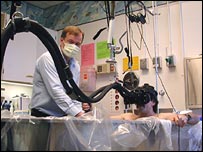 BBC Article talks about how a doctor in a burn center in a hospital in Seattle has had great success using Virtual Reality to help burn victims not feel so much pain. BBC Article talks about how a doctor in a burn center in a hospital in Seattle has had great success using Virtual Reality to help burn victims not feel so much pain.Hoffman's virtual worlds, which he calls by names such as SnowWorld or SpiderWorld, are designed to immerse the user so deeply in the virtual experience that their attention is distracted away from the pain.
SnowWorld, for instance, takes users on an absorbing virtual journey through glaciers and ice caves whilst having to defend themselves from attack by polar bears and penguins.
Mike Robinson, a patient who has undergone the virtual reality treatment, said it helped him to overcome the extreme discomfort he felt when his dressings were changed.
"My pain when the nurse is changing my bandages is consistently extreme," he told BBC News Online. "But during the time I was in VR, I was pretty much unaware that the nurse was even working on my wound. "I mean, at some level I knew she was working on me, but I wasn't thinking about it because I was inside that SnowWorld." That's pretty brilliant. And it goes on to touch on brain chemistry and neurology as to why that might be. Well, another way of looking at it could simply be that you aren't feeling pain if you aren't "in your body". So, if you aren't a fakir who can have an out-of-body experience at will, putting most of your attention into exploring a VR game is obviously a very practical idea. And there's this great quote from the doctor."Pain requires conscious attention. Humans have a limited amount of this and it's hard to do two things at once," Yeah, particularly if you're a man.
[ Science | 2004-02-24 17:32 | | PermaLink ] More >
|
|
| Sunday, February 22, 2004 |  |
|
|
|
Via Jim McGee and others, a set of warning labels for physicists. Yeah, I've seen them before, and they're very funny. A couple of samples: "Some Quantum Physics Theories Suggest That When the Consumer Is Not Directly Observing This Product, It May Cease to Exist or Will Exist Only in a Vague and Undetermined State." "Some Quantum Physics Theories Suggest That When the Consumer Is Not Directly Observing This Product, It May Cease to Exist or Will Exist Only in a Vague and Undetermined State."
 "HANDLE WITH EXTREME CARE: This Product Contains Minute Electrically Charged Particles Moving at Velocities in Excess of Five Hundred Million Miles per Hour." "HANDLE WITH EXTREME CARE: This Product Contains Minute Electrically Charged Particles Moving at Velocities in Excess of Five Hundred Million Miles per Hour."
 "The Entire Physical Universe, Including This Product, May One Day Collapse Back into an Infinitesimally Small Space. Should Another Universe Subsequently Reemerge, the Existence of This Product in That Universe Cannot Be Guaranteed." "The Entire Physical Universe, Including This Product, May One Day Collapse Back into an Infinitesimally Small Space. Should Another Universe Subsequently Reemerge, the Existence of This Product in That Universe Cannot Be Guaranteed."
What is most cool is actually that they're all correct.
[ Science | 2004-02-22 17:55 | | PermaLink ] More >
|
|
|
|
Via Sounding Circle, from Reuters, news of how researchers are beginning to understand how plants manage to split water molecules into hydrogen and oxygen."Results by other groups, including those obtained using lower resolution x-ray crystallography at 3.7 angstroms, have shown that the splitting of water occurs at a catalytic center that consists of four manganese atoms," said So Iwata of Imperial's Department of Biological Sciences.
"We've taken this further by showing that three of the manganese atoms, a calcium atom, and four oxygen atoms form a cubelike structure, which brings stability to the catalytic center," Iwata added in a statement. "Together this arrangement gives strong hints about the water-splitting chemistry." Single cells found in plants or animals, or by themselves as bacteria have for billions of years mastered some clever nano-technology tricks which we'd obviously love to duplicate.
[ Science | 2004-02-22 17:56 | 0 comments | PermaLink ]
|
|
|
|
 I explored what might be available for us in terms of possibilities of catching Danish TV by satellite, and since it was a little hard to figure out, I've better record here what I found so others can find it. I explored what might be available for us in terms of possibilities of catching Danish TV by satellite, and since it was a little hard to figure out, I've better record here what I found so others can find it.
There was already a little satellite parabola on the house here. So, in principle you just add a decoder. And we connected a cheap digital decoder for free channels. The antenna appeared to be pointed to the Astra satellite. Which right away provided 52 channels, of which a handful are encrypted so we can't see them, and of which one is in French, one is German news in English, and the rest are German channels. Which certainly expands the selection, but it isn't what we most would want. We could probably adjust it a bit to point to the Hot Bird satellite, which would give a somewhat different selection. Beyond that I start getting really confused about what's really available.
But what we would really most like is Danish TV. Which is a rather different story. If we had a 2M or so parabola we could receive Danish Canal Digital pay packages on the Thor II satellite. Which would be a huge antenna.
But there have on and off been other possibilities, as least for the main state-run Danish TV channels. Transmissions had been stopped for a while because there were few paying subscribers in southern Europe, and because the signal was widely pirated. The situation was in part remedied by networking and lobbying by Radio Solymar which is a focal point for Scandinavian residents particularly in Southern Spain. There's a lot more Scandinavians there than for example here in the south of France. Anyway, they persuaded DR (Denmark's Radio) to put the signal up again. So, it can be received at the Intelsat 707 satellite on spot 2. Which for us in Toulouse would mean a 80cm parabola. Still bigger than what we have, but certainly a lot more possible. But it isn't free. DR charges 284 euro per year for the subscription. And the broadcast is encrypted so one needs a decoder with the proper CONAX encryption module. Radio Solymar sells a decoder pre-configured for 369 euro. Which is pretty much also the price range for other decoders that can handle the encryption.
But it should soon get easier and better, although probably not cheaper. In the third quarter of 2004 the Telenor satellite company will be switching their services from the about-to-be-junked Intelsat 707 to the fancy new Intelsat 10-02 satellite. Broadcast area for spot 1 is here. Which puts most of Europe inside the sweet spot. Meaning that even a little parabola like ours will do fine. And Telenor has made a point of keeping the DR broadcast even if they might not make much money on it. But hopefully they'll show something else worth watching as well.
Well, it is not that Danish TV is that fantastic. I mean, "Who wants to be a millionaire?" isn't better in Danish than in German or French. But there are certain things we just have a nostalgic joy in watching. Actual Danish series like "Rejseholdet" or "Krøniken", or little entertainment quiz shows with celebrities we still remember. My mom is sending tapes once in a while, which is great, but it would of course be nicer to be able to just turn it on.
[ Information | 2004-02-22 17:56 | | PermaLink ] More >
|
|
| Friday, February 20, 2004 |  |
|
|
|
 Via Sounding Circle, an excellent and scarey Flash Presentation by Eric Blumrich about the 40 year collaboration between the United States and Saddam Hussein, set to the nostalgic music of Bing Crosby. From his careful installation by the CIA, the ongoing military support, to the later clever set-ups for war, and his final "capture". Yeah, we (the U.S.) have always had him. Via Sounding Circle, an excellent and scarey Flash Presentation by Eric Blumrich about the 40 year collaboration between the United States and Saddam Hussein, set to the nostalgic music of Bing Crosby. From his careful installation by the CIA, the ongoing military support, to the later clever set-ups for war, and his final "capture". Yeah, we (the U.S.) have always had him.
[ Politics | 2004-02-20 18:21 | | PermaLink ] More >
|
|
|
|
 Via Seeing the Forrest, from an AP News Story: Via Seeing the Forrest, from an AP News Story:"Federal Reserve Chairman Alan Greenspan said Thursday that Congress should make President Bush's tax cuts permanent and cover the $1 trillion price by trimming future benefits in Social Security and other entitlement programs." What a great idea. Particularly since the social security funds have long since been lent to the U.S. government and only exist in the form of bonds, and thus there would be less reason to ever pay them back.
[ Politics | 2004-02-20 18:21 | | PermaLink ] More >
|
|
|
|
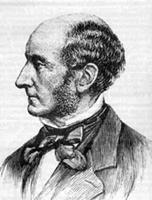 Via Lisa Williams who's reading John Stuart Mill's essay "On Liberty", which is good stuff: Via Lisa Williams who's reading John Stuart Mill's essay "On Liberty", which is good stuff:"The object of this Essay is to assert one very simple principle as entitled to govern absolutely the dealings of society with the individual in the way of compulsion and control, whether the means used be physical force in the form of legal penalties, or the moral coercion of public opinion. That principle is, that the sole end for which mankind are warranted, individually or collectively in interfering with the liberty of action of any of their number, is self-protection. That the only purpose for which power can rightfully be exercised over any member of a civilized community, against his will, is to prevent harm to others. His own good, either physical or moral, is not a sufficient warrant." In brief, you should be free to live your life as you choose, as long as you don't harm others. And government has no right to use its power against you, other than to prevent you from doing harm to others.
Now, wouldn't that be nice. If it were impossible for greedy individuals to manipulate themselves into positions of power where they can force everybody else to adhere to their twisted morals and self-serving business interests. What if government were an agency to ensure such fundamental individual liberty, rather than a primary vehicle for subverting it.
[ Inspiration | 2004-02-20 18:50 | | PermaLink ] More >
|
|
|
|
If you limit your choices only to what seems possible or reasonable, you disconnect yourself from what you truly want, and all that is left is compromise."
- Robert Fritz
[ Inspiration | 2004-02-20 19:24 | 0 comments | PermaLink ]
|
|
| Thursday, February 19, 2004 |  |
|
|
|
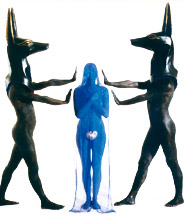 Birgit and I went to the opera last night and saw Verdi's opera Aïda. Which was marvelous. I don't think I've been to the opera ever before. It is kind of something special. At some points there were around 100 people on the stage, with fancy Egyptian themed outfits and props. And a whole orchestra, and, well, those people who can fill up the whole big room with their voices. Not that I could hear what the heck they were singing. It was Italian, for one thing. The French translation showed up on little screens in various places, and was in the program. But I guess one needs to be quite well prepared before one goes to the opera. We had at least read the plot in advance, so we had at least the general idea of what was going on. The performance was in Halle aux Grains, which was an excellent venue. And Toulouse, being a very cultured city, seems to be a good place for big opera productions with big names. I tried to take pictures and little videos at first, but it is sort of a little tacky to sit and fiddle with one's camera in the opera, so I gave it up. Birgit and I went to the opera last night and saw Verdi's opera Aïda. Which was marvelous. I don't think I've been to the opera ever before. It is kind of something special. At some points there were around 100 people on the stage, with fancy Egyptian themed outfits and props. And a whole orchestra, and, well, those people who can fill up the whole big room with their voices. Not that I could hear what the heck they were singing. It was Italian, for one thing. The French translation showed up on little screens in various places, and was in the program. But I guess one needs to be quite well prepared before one goes to the opera. We had at least read the plot in advance, so we had at least the general idea of what was going on. The performance was in Halle aux Grains, which was an excellent venue. And Toulouse, being a very cultured city, seems to be a good place for big opera productions with big names. I tried to take pictures and little videos at first, but it is sort of a little tacky to sit and fiddle with one's camera in the opera, so I gave it up.
[ Diary | 2004-02-19 06:12 | | PermaLink ] More >
|
|
|
|
 Carl Rogers, in an essay from "On becoming a person", titled "To Be That Self Which One Truly Is". Via The Obvious and Older and Growing. Carl Rogers, in an essay from "On becoming a person", titled "To Be That Self Which One Truly Is". Via The Obvious and Older and Growing.Watching my clients, I have come to a much better understanding of creative people. El Greco, for example, must have realised as he looked at some of his early work, that "good artists do not paint like that." But somehow he trusted his own experiencing of life, the process of himself, sufficiently that he could go on expressing his own unique perceptions. It was as though he could say, "Good artists do not paint like this, but I paint like this." Or to move to another field, Ernest Hemingway was surely aware that "good writers do not write like this." But fortunately he move toward being Hemingway, being himself, rather than toward some one else’s conception of a good writer. Einstein seems to have been unusually oblivious to the fact that good physicists did not think his kind of thoughts. Rather than drawing back because of his inadequate academic preparation in physics, he simply moved toward being Einstein, toward thinking his own thoughts, toward being as truly and deeply himself as he could. This is not a phenomenon which occurs only in the artist or the genius. Time and again in my clients, I have seen simple people become significant and creative in their own spheres, as they have developed more trust of the processes going on within themselves, and have dared to feel their own feelings, live by values which they discover within, and express themselves in their own unique ways. Great angle on things. If you only try to do what a good artist or a good writer or a good *something* does, you might well become good, but you probably won't become great, and you won't end up doing what you particularly are here to do. Rather it is about trusting your own process and finding what particularly it is that YOU do, and do that the very best you can.
[ Inspiration | 2004-02-19 10:23 | | PermaLink ] More >
|
|
| Wednesday, February 18, 2004 |  |
|
|
|
 One thing that puzzles me is the big holes there are in the systems for keeping track of people in most places. You know, almost every country in the world are a bit of an authoritarian police state that would like to force all its citizens to pay taxes and not be criminals or terrorists or child molesters, or whatever else they shouldn't be. And most citizens in those countries probably feel like they're thoroughly registered and tracked by their governments. But yet it is done so badly that one should almost think it is completely intentional. One thing that puzzles me is the big holes there are in the systems for keeping track of people in most places. You know, almost every country in the world are a bit of an authoritarian police state that would like to force all its citizens to pay taxes and not be criminals or terrorists or child molesters, or whatever else they shouldn't be. And most citizens in those countries probably feel like they're thoroughly registered and tracked by their governments. But yet it is done so badly that one should almost think it is completely intentional.
It shouldn't be a hard problem to make an all-pervasive register of the citizens in a certain country. For that matter, it shouldn't be all that hard to make a rather complete centralized register of the six billion plus people on the planet. Hey, I could design the database if I had to, without too much trouble. Give everybody a unique identifier that one can only have one of, and catch any unregistered births the moment they show up at the doctor or in school or in a bank or at a border, and get them into the system. It would make it much easier to make sure that people paid their taxes and that they could be tracked if they did something "bad".
I'm rather content with it not being that way, as I don't trust authoritarian governments, particularly the ones with some kind of moral or religious agenda, but I don't thoroughly understand why it isn't that way. Despite what it might feel like, the tracking is very sloppy or non-existent in most places.
In the U.S. the ID number is the Social Security Number. There are first of all ways of not having one at all, even though that's cumbersome. But you can also quite easily get one by showing a few pieces of paper. And nothing serious stops you from having several. In many situations you can just make up a number or use somebody else's. In the U.S. the IRS only seems to pay much attention to you if you've volunteered by starting to file tax returns. If you don't start, or you get lost a little bit by changing your name, they probably lose track of you. If you just stop filing your tax return and move somewhere else, nothing much happens either. I was an illegal alien in the U.S. for years, and it didn't make much difference. I'm sure there are several million.
And here I am in France. Did I tell the U.S. that I moved? Not particularly. And there isn't any very official way of doing so anyway. I changed address to some friends who check my mail. I haven't decided if I will bother to keep filing U.S. tax returns, or whether I want to attempt to keep my greencard status. If I just forgot about it, nothing much would happen. And did I tell France that I now live here? Well, I rent a house, opened bank accounts. And the previous rule was that within 3 months you need to go and apply for a Carte de Sejour residence permit. But that system got cancelled, and so far not replaced with anything else. So, we're here, obviously, and have a right to be here, but we're not particularly in the system in any significant way. Showing our Danish passports works fine as ID and opens most doors. "Oh, you're Danish, that's in the EU, right? Then pas de probleme!" Likewise we can freely travel to any other EU country, and nobody's even going to look at us at the border. But we haven't lived in Denmark for 19 years. Denmark has practically forgotten all about us. Oh, we could go right back any time, and start acting Danish. But at this point we're sort of in-between countries, without being clearly identified as fitting in one place or the other.
Now the thought is that maybe that's the ideal. And maybe these loopholes are quite deliberate, to pave the way for the free global movement of capital. I'm sure it isn't meant for me, but probably rather for people who have large vested interests in being a bit outside the system, and able to move their money and their interests around without anybody noticing very much. There are of course more range of freedom if you have a complicated network of companies in different countries, off-shore trusts, anonymous banking, and citizenship in multiple countries. And your holdings are in the name of all sorts of different entities that can't easily be tracked. And you yourself are perpetually on vacation, moving around between your homes in different countries, or hanging out on your yacht.
The close scrutiny of people seems to apply mostly to people who volunteer to be good local national citizens. You get a job, a local bank account, buy a house, get a phone, all in your own name. And you stay put, and get busy watching TV and going to work and paying your bills.
Or you somehow fall into the large cracks in the system, temporarily or permanently, accidentally or deliberately. You might have no paperwork, or phoney paperwork. You might be a criminal who deliberately cover your tracks. You might have carefully removed yourself from the system by studying the basis for the laws and revoked your agreement with various implicit contracts. Or you might just be in a country where nobody expects you or looks for you. Or you have an army of lawyers and accountants who do everything for you, administering your holdings of wealth, but vigorously keeping you out of the obvious picture. I suspect it is for the latter that the loop holes are allowed to exist, and even be expanded.
[ Culture | 2004-02-18 08:39 | | PermaLink ] More >
|
|
|
|
 Alexandra Polier got involved in a potential looming scandal for leading U.S. democratic presidential candidate John Kerry. Somebody thought he'd been having an affair with her, and he denied it. And so does she, and there probably wasn't anything to it. She once dated one of his staff members, and it was all a big misunderstanding, probably. And so what if it wasn't? But journalists and political opponents are looking hard for anything incriminating. So now look at something like this article. Somebody found her profile in Friendster. OK, seems like it has been pruned a bit since then, but when they looked at it, it was a Friendster profile like thousands of others, saying things like: Alexandra Polier got involved in a potential looming scandal for leading U.S. democratic presidential candidate John Kerry. Somebody thought he'd been having an affair with her, and he denied it. And so does she, and there probably wasn't anything to it. She once dated one of his staff members, and it was all a big misunderstanding, probably. And so what if it wasn't? But journalists and political opponents are looking hard for anything incriminating. So now look at something like this article. Somebody found her profile in Friendster. OK, seems like it has been pruned a bit since then, but when they looked at it, it was a Friendster profile like thousands of others, saying things like:"About Me: just another hot piece of ass with a philosophy degree and a love for old movies. I'm afraid of death, hospitals and insects. I can't spell. I like old people. I want to travel the world reporting on injustices while taking the time to enjoy an umbrella drink when appropriate." And it lists her being in an open relationship (gasp!) and stuff like that. Nothing special. Except for when the world press is scrutinizing your life looking for any sign that would indicate you to be some kind of loose woman who would be likely to have an affair with some important politician. Stupid moralizing hypocricy on the side of such journalists and the people who pretend to be shocked at reading about it.
But 100s of thousands of people are very publically posting stuff like that in online networks or on their blogs or other webpages or forums or discussion groups. People like me, who're generally open to living your life fairly out in the open, and who feel that the advantages of open networking outweighs the downsides. At least until you suddenly are put particularly in the spotlight, and any little comment you might have made can be greatly misconstrued and taken out of context, painting a picture of you that isn't really true.
I've had a bit of a taste of that recently myself. I unfortunately can't post the full story, because it is causing some other people much bigger problems than it is causing me. I found it kind of hilarious and entertaining, even if it is very mean-spirited. In brief, a friend of mine has an organization in Germany inspiring young people to choose positive directions in their lives. Somewhere on the website there's a quote from me and a link to one or more of my websites. An investigating journalist was bent on finding some dirt on this organization, to bring it down, for some reason that isn't entirely clear, other than that it is somehow "alternative". So, he started investigating anything he could find on me and anybody else linked from the site that could possibly be a good target. And, well, there's a wealth of material on the net about me, both what I've written, and references to things I've done in other parts of my life. Taking some of those references out of context, and forgetting to look at the date, the guy decided I am some kind of top Scientology cult leader. Scientology is a very bad word in a number of European countries, so any kind of association is about at the same level as being a Nazi or a Satanist. And I used to be a scientologist. To be precise, I was kicked out and excommunicated 22 years ago, quite thoroughly. Scientologists are forbidden from even speaking to me. And, sure, I've been friends with people who used to be top scientologists. And, sure I've practiced various alternative therapies and written books. A good scientologist wouldn't recognize any of that as being scientology, but if you don't look too closely, you might quickly conclude that it must all be the same kind of weird occult brainwashing type of stuff.
This journalist also found my blog, which told him I had moved from the U.S. to France recently. And he searched the net and found my profile in OpenBC, an online business network with a European focus. Which happens to have its company headquarters in Germany. And he sort of added these things - badly - together, and concluded that I am a top Scientologist who's about to invade Germany in order to corrupt young people's minds.
So, while I'm just sitting around here, in France, minding my own business, trying to survive - there I suddenly am, last month, on the front page of a minor German business newspaper. Big color picture of me, taken from my blog. And this whole harebrained story, painted in rather threatening terms, guessing heavy-handedly at my possible hidden motives for establishing a "business presence" in Germany. You know, that OpenBC profile! It is all kind of funny, and doesn't really bother me personally. For that matter I'm kind of flattered. But it is bad for my friend who actually is trying to do some good things, and who's name gets smeared by his association with unscrupulous and sinister characters such as me, however fanciful the story is.
I don't think I personally want to change anything about how open I am with posting things. I believe the answer generally is MORE communication, not less. Sure, you can come and take one thing out of context, but there's plenty of other material that can balance the picture, if an intelligent person bothers to look. And if there's anything in particular I think might easily be misunderstood, I'd rather be the first one to write about it myself, before anybody else gets a scoop out of revealing it.
There's always a bit of a danger in being a multi-facetted, open-minded person with varied interests and years of colorful experiences exploring different things. ANY part of it might pop up out of context anywhere. Your sexual preferences, your history of drug use, something you said sometime when you were really depressed, something you thought was said to a closed group of friendly people, those pictures your ex-boyfriend took of you - anything. But in the long run, I think that's a good thing. It makes it much harder to claim that any of us are just one-dimensional perfect people without a spot on their record. If we all have lots of varied spots, it no longer is such a good weapon to come along and discredit you by bringing out one little controversial piece of information from your past, which just happens to play well in a soundbite.
[ Culture | 2004-02-18 10:16 | | PermaLink ] More >
|
|
| Tuesday, February 17, 2004 |  |
|
|
|
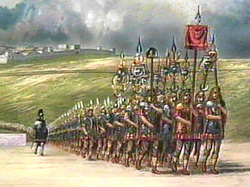 Johan Galtung is a professor of peace studies and a very studied man. He's written many big picture papers with lots of historic analysis about peace and war and the decline and fall of empires. Of most current interest might be "On the Coming Decline and Johan Galtung is a professor of peace studies and a very studied man. He's written many big picture papers with lots of historic analysis about peace and war and the decline and fall of empires. Of most current interest might be "On the Coming Decline and
Fall of the US Empire". Or, for a more historical comparison, read "The Decline and Fall of Empires", written for the United Nations Research Institute on Development in 1996, where he analyses and compares the decline and fall of 9 past empires, and, again, the United States, the only current empire. They all fail sooner or later, but not all for the same reasons, even though there seems to be some common factors. For most empires their decline generally come about from a lack of balance, a foundation of endless expansion and exploitation, pissing off a lot of people in the periphery, who are the ones being exploited, and a certain laziness that develops in the materially nonproductive elite in the center, where it becomes easier to buy or steal things from somebody else somewhere else than to bother to produce it oneself. And a falling apart of infrastructure, because it wasn't designed to be sustainable, and because those who designed the parts that worked no longer cared, or no longer were around. Anyway, here's a bit of a moral and a somewhat positive twist in the form of a metaphor of rats and ships:"These are ten stories of sinking ships, and ships usually harbor rats known to leave sinking ships. But who are the rats, and what do they do after leaving the sinking ship? They probably do not leave to drown, but possibly to find a new ship and a new life?
The immediate answer would be to find a new ship, although some rats may prefer dignified suicide to a life in the ruins of their own creation. There are exceptions like the captain of the sinking ship, the last one to leave even at the risk of joining the ship on its way down. Like ship captain, like captain of the state ship, the head of state. In principle. But in fact he often prefers escape and ends up as a monarch in exile, unable to find new ships. Better a life in faded splendor than death or suicide.
But we are thinking of more dynamic rats, not of aristoc-rats or bureauc-rats, but of creative clergy and intellectual ratss, and indeed entrepreneurial merchant rats. Each imperial decline creates its exodus and its diaspora. The question is, what kind of talent left, and where did they go? Regardless of the answer, this is clearly an illustration of Buddhist rebirth rather than Hindu reincarnation, let alone Christian eternal life.
The system does not reincarnate with many of its original features intact. By dying the system liberates creative energy, in the form of a diaspora which then starts working somewhere else. The obvious prognosis would be [1] given reasonable conditions they will probably succeed, [2] if or when there is no success they will probably leave the new sinking ship. Once a rat always a rat.
A major importer of rats leaving European sinking ships has been the USA. But the USA may also one day become a net exporter if the decline in mini-study 10 broadens and deepens further.
What people can do, countries may also do. Societies are to a large extent center-periphery systems with the center defining the problems and how to solve them, and the periphery doing the menial tasks of implementing the decisions. In the same vein, the World is to a large extent a Center-Periphery system, with the Center deciding what to do, giving minor roles to the Periphery countries, e.g., as defined by Ricardo's comparative advantages "theory", or ideology rather, of international trade.
But what happens if the center of society, or the Center of the world, declines? The social periphery may decide to leave, and vast caravans, trains of people, migrants in search of work and more promising conditions elsewhere will accompany the decline. The center minority may try to keep the migration within bonds, by sheer force or by the Toynbee formula, responding creatively to the crisis challenge by initiating new departures to convince the majority that they are still in command of the situation. Maybe they have three chances. After that, the periphery leaves, if not physically by migrating, then spiritually through lost allegiance.
Satellite client countries in the Periphery may do the same. They watch for the signs, and may decide to turn from a former Center to a new Center, like Eastern Europe from the Soviet Union to the EU and the USA. Malaysia, Australia and New Zealand, parts of the UK Center-Periphery system may look to Japan for new roles. Norway changed her allegiance from the USA (before that the UK, before that Sweden, before that Denmark) to the European Union. The latter seem better at practicing Toynbee. One Center elite may not be able to convince its Periphery, but by pooling together they may come up with a more attractive formula, like the Yaoundé-Lomé system for the African-Caribbean-Pacific countries.
Looking at the list of cases it is obvious that there are some genealogies at work. A major function of a dying system is to leave the scene, providing a niche of new economic opportunities to others. Brutal, but "such is life". "Decline and fall" is only one half of the story. The other half are the new ships, boarded or not by old, partly recycled, rats.
And thus it was that West Rome yielded to Franks and Gauls, and in the longer run to the Carolingians. Two centuries after the fall the Umayyad Arab empire of Damascus, defeated by the Abassids of Baghdad, changed the gap in Spain into the Caliphate of Córdoba (712). A dying Byzants had to yield to the triumphant Ottomans, and Spain to the Italian (and Low Countries) city-states and to the UK. The Ottomans had to yield to Russia, and to the Habsburgs and UK/France. And UK and Russia's successor, the Soviet Empire, had to yield to the USA. And to whom will ultimately the USA be yielding? To an expanded EU, to an East Asian Community, or both?
China has her own logic. The Ch'ing dynasty did not yield to any other country (except, for a short while to UK/France and some others), but to the Kuomintang dynasty, which in turn had to yield to the Communist dynasty; in both cases for much more than economic reasons narrowly defined. Precisely for this reason China has to be conceived of as a diachronic chain of dynasties rather than as a synchronic system of competitors, struggling over the same space.
This serves to relativize the concepts of decline and fall. A human being falls ill and dies, the family or somebody else fills the space. Societies also have families, inside their territory, or outside. None has a claim on eternal life. The death cause is interesting among other reasons to know whether euthanasia and midwifery would be the solution." Or maybe you can freeze the old empire cryogenically and thaw it up and look at it once in a while. Anyway, a key point is that the creative, positive life forces move on. Nothing oppressive can last forever, because it usually doesn't work very well. If the oppressed get bored with the game and refuse to play along, the picture sometimes transforms really quickly. But most empires leave some kind of positive legacy behind, of culture and ideals that might survive for a long time, even if the reality might have been brutal and unsustainable.
[ History | 2004-02-17 22:16 | | PermaLink ] More >
|
|
| Monday, February 16, 2004 |  |
|
|
|
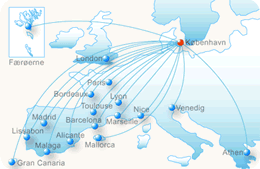 Thomas says: Thomas says:"On the 29th of March Maersk Air will open the route Copenhagen to Toulouse, which will be the first direct flight since I arrived in Toulouse. I have done a few searches and it seems like they only fly from Toulouse to Copenhagen on Mondays which is not that good since it rules out weekend visits, but the positive thing is that the trip will only take 2 hours and 15 minutes and will cost around 108 Euro per adult. Before you had to fly through Germany, Paris or Amsterdam and the cheapest tickets cost around 250 Euro." That's great news, even if it is just Mondays! Easier for our family to get here, and more likely that we can make the trip home more often. Gee, cheap direct flights to anywhere but London and Paris seemed like such an unobtainable luxury.
[ Information | 2004-02-16 14:56 | | PermaLink ] More >
|
|
|
|
 Now that it looks like my own economy is looking up a little bit for the moment, I can more comfortably write about the ups and downs of poverty. No, not the kind of poverty where you're living in a cardboard shack in the third world and there are no crops, no food, and no clean water, as I haven't personally experienced that. But the kind of poverty one can experience in a rich western country when one is trying to make ends meet, and they don't quite meet, no matter how fast one runs, and one never quite manages to do things the logical and sensible way. Now that it looks like my own economy is looking up a little bit for the moment, I can more comfortably write about the ups and downs of poverty. No, not the kind of poverty where you're living in a cardboard shack in the third world and there are no crops, no food, and no clean water, as I haven't personally experienced that. But the kind of poverty one can experience in a rich western country when one is trying to make ends meet, and they don't quite meet, no matter how fast one runs, and one never quite manages to do things the logical and sensible way.
A lot of things in a capitalistic society are arranged to provide economic incentives to do things the "right" way. You know, you get fines of various kinds if you do it the "wrong" way. And maybe a lot of that makes sense if you're sitting with a spreadsheet and calculating how to distribute your funds over the next couple of years. But it often becomes a very cruel arrangement when one lives from paycheck to paycheck and somehow has dug oneself into a hole one can't just step out of.
A typical example is that you have a car, but you can't afford the insurance. Can you really be considered to be poor if you have a car and live in a house with a yard? Well, in some places you'd be considered rich. But if you live in Los Angeles you've probably gotten the idea that those are the basic necessities of life. So maybe it is an old car, but you have one or two, unless you're homeless. So, for the example, there was a period of time where I couldn't afford the $4-500 per month for car insurance, so I didn't have any. And I got stopped by the police, and in court the judge gave me a fine of $800 and graciously he gave me a few months to pay for it. Now, if I was the spreadsheet person with money in the bank, I can quickly make the calculation that it would be cheaper just to have the insurance and anything else I'm supposed to have. But if I'm just somebody who didn't have the money? OK, then I owe another $800. Does that motivate me to pay that plus the insurance I couldn't afford? Well, yes, but it certainly doesn't make it easier. So, I didn't pay that either. So at some point when I had parked somewhere, the car got impounded by the police. Which costs $10 per day in storage fees, plus a few hundreds of other fees, plus you have to pay everything you owe to get your car back. Which took me a couple of weeks to come up with, and it was way over $2000 at that time. And I still needed to go and get insurance.
To a lot of good citizens that just means I'm an idiot and I could just keep my stuff in order in the first place. So, I'm trying to explain that there's a different kind of world, where it isn't just a matter of "keeping it in order", but a matter of how expensive it is to be a little behind rather than a little ahead, and how difficult it is to keep up with the Joneses, even if badly.
Another example. After I went bankrupt 12 or so years ago I was quite happy with not having any credit lines. Declaring bankrupty was a relief, after realizing my fixed expenses were more than $7000 per month, and that there were no way of meeting them, let alone eat, if I earned less than that. Even if I earned what under other circumstances would be considered a very handsome living. So since then the policy was to not buy anything I didn't have the money for in cash. But, well, sooner or later we got credit cards again, for the convenience of buying things remotely. And I paid them every month in full, until some point this year where things were wearing a bit thin, and they ended up more or less maxed out. Not a lot of money, but $4000 or so. Which I didn't pay very much attention to at first. But now recently, where I only had barely what we needed for survival, I noticed what it actually was costing, even though I hadn't used these cards for a long time. I also notice that things were carefully arranged to make it really expensive to be close to the maximum. Each month I paid the amount suggested by the credit card company, on time. But each month each of the cards still went "over limit", which added a $30-40 extra charge for each card. Notice, I'm not using those cards, just paying the monthly amount. Still it was more than $200 per month. And now recently my U.S. checking account was out of commission because of my problem with Budget Rent-a-car, so I couldn't pay the cards at all for two and a half months. That ended up costing about $800 in charges for those same credit cards. And this all, of course, motivates me to "keep my things in order". Yeah sure.
One thing takes another. A bit of a vicious cycle. So if you just are busy with work and life, and trying to pay your rent and your car insurance and avoid that the electricity gets turned off, and so forth, then at the end of the year I might notice that I don't really have the $20K that the IRS would like to be paid. So they add a lot of charges and fines to it, and make an agreement with me that is carefully calculated so that I never ever will finish paying off, as I'm only paying the interest.
And, well, with all of that you don't really get around to doing sensible things like putting money away for your retirement, or even having one month worth of expenses in reserve. Because there's always some kind of emergency you need to deal with. Or when one month there isn't, you decide to then get health insurance, which leaves you stuck with another $600 a month. Or you decide to buy a new computer or go to a conference or something.
Mind you, I haven't really made less than $60K a year for the last 18 years, and often twice as much. I've never worked less than 80 hours a week in that time. And it is not like we've had an extravagant lifestyle. Old cars, second-hand furniture, hardly any clothes shopping, kids in public schools, lower middleclass neighborhood. And at the times I've been having job jobs together with other more normal people, I've noticed how lots of them who earned less than me seemed to spend all the time talking about their mortgages, their retirement accounts, their stock market investments, their $40K cars, the college funds for their kids, and their vacation in Bora Bora, and mysteriously they seemed to have their affairs perfectly in order.
So, am I just a little stupid and bad at math? Oh, that might be, and lots of people will probably conclude that. But that isn't my main point here. OK, for some folks it comes completely natural to do the right thing, and they seem to be in synch with the economic rules of society. But there are lots of other well-intended and hard-working folks, most in dual-income households, often in a much lower pay range than what I'm usually blessed with, but who also are stuck in similar or worse vicious cycles. Having bad credit and therefore getting worse rates on everything. Owing back taxes, having credit card bills, car payments, and spending way too much money on stupid late fees, and never quite getting their heads above water.
There are various possible avenues of answers, of course. One could make a lot more money so that one could comfortably pay for the same lifestyle one's neighbors have. One could succeed in adopting a regimen where one keeps a sensible budget and sets aside reserves. One could get a stable job with a company that draws your taxes every month and sets aside retirement money and profit sharing for you. One could simplify one's life greatly and grow one's own food and forget about cars and cable TV. One could dream up a different kind of society that doesn't keep most of its citizens stuck in a rat's maze.
Anyway, poverty sucks.
[ Diary | 2004-02-16 17:59 | | PermaLink ] More >
|
|
|
|
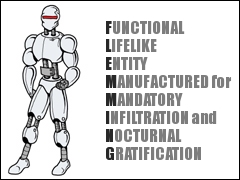 Seen on Shadow Central, this is my code from the Cyborg Name Generator. OK, I thought it was gonna be stupid, but this is not half bad. Seen on Shadow Central, this is my code from the Cyborg Name Generator. OK, I thought it was gonna be stupid, but this is not half bad.
[ Inspiration | 2004-02-16 18:24 | | PermaLink ] More >
|
|
| Sunday, February 15, 2004 |  |
|
|
|
 An article The Microsoft Killers about the success of open source and how it is spreading to other areas than software. And this nice general description of what it is we're talking about: An article The Microsoft Killers about the success of open source and how it is spreading to other areas than software. And this nice general description of what it is we're talking about:Yochai Benkler, a law professor at Yale University, has called this "commons-based peer production." The commons refers to the sharing of the underlying code or the output that is open to all, akin to the public land that farmers once grazed their livestock upon. Peer production means that producers participate for their own varied reasons and in ad hoc ways, not necessarily via legal contract or management fiat. Benkler calls this a third mode of production for the market, distinct from the company and the "spot market" (or, in employment terms, the freelancer). Open source shows that it is possible for part of the economy to function without companies but with many self-employed individuals contracting with each other. It mentions various expamples. Nasa's Clickworkers project where 85,000 people successfully helped identify geological features on Mars. The Wikipedia, a fabulous online encyclopedia that anybody can contribute to. MIT's OpenCourseWare, freely available study materials for hundreds of courses. Open access academic journals like BioMed Central. And more.
I can't wait for it to spread to more areas.
[ Organization | 2004-02-15 12:58 | | PermaLink ] More >
|
|
|
|
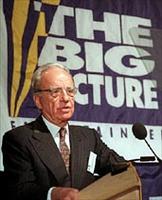 Via Ben Hammersley, London Review of Books has a review about Rupert Murdoch biographies. Pay attention to the figures: Via Ben Hammersley, London Review of Books has a review about Rupert Murdoch biographies. Pay attention to the figures:And then Chenoweth has found, looking at the accounts, that the company’s profits, declared in Australian dollars, were A$364,364,000 in 1987, A$464,464,000 in 1988, A$496,496,000 in 1989 and A$282,282,000 in 1990. The odds that such figures were a happy coincidence are 1,000,000,000,000 to one. That little grace note in the sums is accountant-speak for ‘Fuck you.’ Faced with this level of financial wizardry, all the ordinary taxpayer can do is cry ‘Bravo l’artiste!’ Yeah, I wish I had accountants who could make my profit turn into such pretty numbers. Of course part of the trick is to have some surplus profits that you can hide away to the exact amount you want.
[ Information | 2004-02-15 13:28 | 0 comments | PermaLink ]
|
|
|
|
 Article in The Economist about the likely possibility that the dark energy and dark matter essential to modern explanations of the universe doesn't really exist as predicted. Article in The Economist about the likely possibility that the dark energy and dark matter essential to modern explanations of the universe doesn't really exist as predicted.IT WAS beautiful, complex and wrong. In 150AD, Ptolemy of Alexandria published his theory of epicycles—the idea that the moon, the sun and the planets moved in circles which were moving in circles which were moving in circles around the Earth. This theory explained the motion of celestial objects to an astonishing degree of precision. It was, however, what computer programmers call a kludge: a dirty, inelegant solution. Some 1,500 years later, Johannes Kepler, a German astronomer, replaced the whole complex edifice with three simple laws.
Some people think modern astronomy is based on a kludge similar to Ptolemy's. At the moment, the received wisdom is that the obvious stuff in the universe—stars, planets, gas clouds and so on—is actually only 4% of its total content. About another quarter is so-called cold, dark matter, which is made of different particles from the familiar sort of matter, and can interact with the latter only via gravity. The remaining 70% is even stranger. It is known as dark energy, and acts to push the universe apart. However, the existence of cold, dark matter and dark energy has to be inferred from their effects on the visible, familiar stuff. If something else is actually causing those effects, the whole theoretical edifice would come crashing down. New analysis seems to indicate that the numbers don't match up, and that remote clusters of galaxies are more correctly explained if they contain more ordinary matter. Not that I really understand much of this, but it is just a reminder that most of the prevalent scientific theories about the universe are just that - theories. Somebody's best guess about how things work, often including weird and unseen factors to get the numbers to fit.
[ Science | 2004-02-15 13:44 | | PermaLink ] More >
|
|
| Saturday, February 14, 2004 |  |
|
|
|
 It is valentine's day, so some love poems from Rumi would be in good order. It is valentine's day, so some love poems from Rumi would be in good order.
The minute I heard my first love story,
I started looking for you, not knowing
how blind that was.
Lovers don't finally meet somewhere,
they're in each other all along.

Love is from the infinite, and will remain until eternity.
the seeker of love escapes the chains of birth and death.
Tomorrow, when resurrection comes,
The heart that is not in love will fail the test.

When I am with you, we stay up all night,
When you're not here, I can't get to sleep.
Praise God for these two insomnias!
And the difference between them.

Suddenly the drunken sweetheart appeared out of my door.
She drank a cup of ruby wine and sat by my side.
Seeing and holding the lockets of her hair
My face became all eyes, and my eyes all hands.

With the Beloved's water of life, no illness remains
In the Beloved's rose garden of union, no thorn remains.
They say there is a window from one heart to another
How can there be a window where no wall remains?
I found them here
[ Inspiration | 2004-02-14 08:07 | | PermaLink ] More >
|
|
|
|
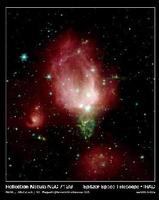 A couple of cool astronomical finds in the last couple of days. First one you can see on the left in a picture from the Spitzer Space Telescope. It is a cluster of newborn stars called NGC 7129, 3300 lightyears away in the constellation Cepheus. The nebulosity is rose-colored and rosebud-shaped. And all these stars are found in a piece of space about the same size as the distance between the Sun and the nearest star to here, Proxima Centauri. A couple of cool astronomical finds in the last couple of days. First one you can see on the left in a picture from the Spitzer Space Telescope. It is a cluster of newborn stars called NGC 7129, 3300 lightyears away in the constellation Cepheus. The nebulosity is rose-colored and rosebud-shaped. And all these stars are found in a piece of space about the same size as the distance between the Sun and the nearest star to here, Proxima Centauri.
 What you see on the right is not a photo. But what it depicts is rather amazing. It is a crystallized white dwarf named BPM 37093. A white dwarf is the hot core of a star, left over after the star uses up its nuclear fuel and dies. It is made mostly of carbon and is coated by a thin layer of hydrogen and helium gases. And in this case it has now been found that the core of this star is solid diamond. It is 2,500 miles across and weighs 5 million trillion trillion pounds, which translates to approximately 10 billion trillion trillion carats, if you want to measure it as an earth diamond. Supposedly our sun will end its days as a diamond as well. What you see on the right is not a photo. But what it depicts is rather amazing. It is a crystallized white dwarf named BPM 37093. A white dwarf is the hot core of a star, left over after the star uses up its nuclear fuel and dies. It is made mostly of carbon and is coated by a thin layer of hydrogen and helium gases. And in this case it has now been found that the core of this star is solid diamond. It is 2,500 miles across and weighs 5 million trillion trillion pounds, which translates to approximately 10 billion trillion trillion carats, if you want to measure it as an earth diamond. Supposedly our sun will end its days as a diamond as well.
[ Science | 2004-02-14 18:42 | | PermaLink ] More >
|
|
| Friday, February 13, 2004 |  |
|
|
|
 Danah Boyd gave a speech at the Emerging Technologies conference a couple of days ago which seems quite interesting, looking at the transscript. She goes through various kinds of research related to social networks. Things that have been learned, things that don't work, misunderstandings, etc. Danah Boyd gave a speech at the Emerging Technologies conference a couple of days ago which seems quite interesting, looking at the transscript. She goes through various kinds of research related to social networks. Things that have been learned, things that don't work, misunderstandings, etc.
Like the famous 6 degrees of separation. The well-known experiment found random people to be on the average 5.5 hops away from other random people. But that was when they had to guess at who they should contact to get to somebody else, and when they didn't really know. It would be different if we could actually see the whole network. Like, fewer jumps.
Research has shown that people often find, for example, jobs through weak ties. I.e. people you know, but not very well. And online social networks usually try to mimic a setup of having strong ties and weak ties, and one of the implications is that it would help you get jobs and dates. But the friends you have in an online network aren't necessarily like the friends in real life, and the friends or those friends are not really like the weak tie connections in your life.
And there's the matter of context. Just because you know somebody, even very well, in a certain context, doesn't mean you feel comfortable about doing things for them in another context. It might not seem right to make an introduction to a job you know nothing about, just because you often go out drinking with somebody. And the expectation of your connections that you'll do that kind of favors for them sort of wears on you and your actual network."Asking favors is fundamentally different than offering them. People gain by being bridges. Thus, to be able to tell you about a job gives me whuffie in our relationship. Feeling pressured to connect you to an open job makes me uncomfortable. In all of the networks described above, the bridge got to control the information flow. In Milgram's "Small Worlds," if you didn't know that i knew the target person, you may not have tried to pass it on to me. If you don't know that i am dating someone who has something that you want, you won't try to pressure me into giving you access to it. Thus, i can choose when to reveal my connections in a situation where i can come across as being helpful, rather than being put in a position to feel cornered. Revealing the network shifts the power." Which reminds me that a few of the best networkers I know wouldn't really dream of using an online network where you list all your friends, and catalogue everything you're into. I get to think of one friend who's name I'm not even going to mention. We only talk at the most once per six months or a year. But every time we talk for an hour or so, and usually he introduces me to some concept or project or person that he carefully has handpicked for me. And each time it is very valuable and appropriate. And he wouldn't dream of just introducing everybody in his rolodex to everybody else.
So, even though there are lots of benefits from free-flowing networking and sharing a lot of things in blogs, all of those connections aren't necessarily what they seem. Some connections are really weaker than they seem, and some are more important than is apparent. And the properties of the network interface makes people do all sorts of things that might obfuscate the real story.
We still don't really have all the solutions. Social behavior doesn't necessarily have merely technological solutions.
[ Organization | 2004-02-13 20:04 | | PermaLink ] More >
|
|
|
|
 Denham Grey: Documentation & knowledge. A oft repeated question / assertion in KM is the link between explicit documentation and knowledge. The point I'm trying to make, is documentation alone does not = knowledge. To retain knowledge against attrition you have to have a community that can appreciate the context, understand the issues, talk the language, adopt the assumptions, share the tricks, interpret and adapt the explicit stuff to changing external circumstances."
Matt Mower: "I have formed the view that it is intrinsic to knowledge that it be actionable. By this I do not mean that it necessarily provokes action, but that it enables it. From this viewpoint the question is documentation knowledge? doesn't matter very much. Any particular document may, or may not, be knowledge; to different people, and at different times. Everything depends upon the context." How about if no document can possibly be knowledge. Knowledge is meaning and shared understanding. Some representation of data might contain more or less information, depending on how much signal is there, and if there's a way of reading it. And the information only becomes knowledge to the degree that I draw meaning from it. If it is in a language I don't understand, there would be close to zero knowledge for me. But does it have to be actioable? I don't necessarily think so. It has to enable the action on my part of acquiring, possessing and changing meaning. I might find some new meaning, or I might be reminded of what I already know. But, depending on the context, I might or might not be happy with the mere knowledge, without having anything particular to go and do with it. It might just become part of me, and thus become wisdom. Which might mean that I might be more able and capable to act or not in the future, without any longer having to keep track of what information or knowledge enabled me to do so.
[ Knowledge | 2004-02-13 20:39 | | PermaLink ] More >
|
|
<< Newer stories Page: 1 ... 41 42 43 44 45 ... 97 Older stories >> |
|

This is a collage of things that catch my eye, things that need to be said, and stuff I really care about
TRUTH
BEAUTY
FREEDOM
LOVE
TECHNOLOGY
|
| Mon | Tue | Wed | Thu | Fri | Sat | Sun |
|---|
|
|
|
|
|
|
1 |
| 2 |
3 |
4 |
5 |
6 |
7 |
8 |
| 9 |
10 |
11 |
12 |
13 |
14 |
15 |
| 16 |
17 |
18 |
19 |
20 |
21 |
22 |
| 23 |
24 |
25 |
26 |
27 |
28 |
|
|




